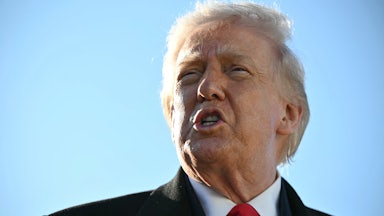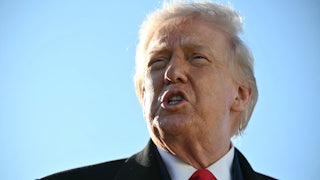It’s perhaps hard to imagine today, but we have two landmark books to thank for some of the U.S. government’s most vital public health regulations. Upton Sinclair’s The Jungle, published in 1905, shined a light on the unsanitary and unsafe practices of the meatpacking industry and eventually led to the creation of the Food and Drug Administration, which regulates the safety of products for human consumption. In 1962, Rachel Carson’s Silent Spring exposed the toxicity of the pesticide DDT, which helped lay the groundwork for the creation of the Environmental Protection Agency. Today, these two agencies are part of a multitude of government regulatory bodies that ensure the health and safety of Americans.
Those bodies now find themselves under threat from right-wing politicians and legal activists alike, who together are working to gut the so-called administrative state on the grounds that it is supposedly bloated, leftist, and too powerful. But these efforts, which include two Supreme Court cases this term as well as Donald Trump’s second-term plans, would have tangible and severe consequences not just for those who keep our government functioning every day but for the hundreds of millions of Americans who rely on that government to keep them safe and healthy.
The federal government is a gargantuan institution tasked with regulating all sorts of small but consequential minutiae of American life—everything from regulations on airline safety to workplace standards for dealing with hazardous chemicals. Congress grants agencies the power to set these rules themselves—the FDA is governed by the Federal Food, Drug, and Cosmetic Act of 1938, while the EPA’s power is spread among laws like the Clean Air and Clean Water Acts—because Congress itself has neither the time nor the expertise to decide, or even simply review, the thousands of rules finalized every year.
But conservatives want to eliminate these agencies’ long-standing legal authority, and they just might succeed thanks to two consequential cases before the Supreme Court. One is a challenge to the FDA’s approval of mifepristone, the abortion medication, which the plaintiffs—a coalition of anti-abortion medical professionals—claim was insufficiently vetted. In oral arguments last month, the Supreme Court signaled it might find that the plaintiffs do not have standing, but if the justices decide otherwise and side with the plaintiffs, experts warn that the FDA’s regulatory processes would be completely undermined. People would have the ability to challenge drugs for any reason, political or otherwise.
Things are far grimmer with the second case, which calls upon the Supreme Court to overturn Chevron v. NRDC. That 1984 ruling established the so-called Chevron doctrine, effectively allowing the EPA and federal agencies to use their relevant expertise to interpret ambiguous federal statutes when they make rules; courts then defer to regulatory agencies’ expertise. To put it plainly, if congressional bills had to outline every specific instance in which an agency had to act, Congress would have to update bills constantly for regulatory agencies to function.
The EPA is not the one facing scrutiny in this case, but rather the National Marine Fisheries Service, a division of the National Oceanic and Atmospheric Administration. In arguments in January, the Supreme Court appeared willing to disregard or limit the Chevron ruling completely, which would make expert decisions made by regulatory agencies subject to far more legal scrutiny. Just like the aforementioned FDA case, a judge can override the expertise of regulatory agencies and overturn rules, however specific and niche they may be. Public health experts have warned that this would dramatically limit the ability of agencies like the FDA and Center for Medicare and Medicaid Services to operate by subjecting them to routine legal interference.
Some examples of these rules implemented in the past year include: rules reducing methane from oil and gas production, rules allowing for increased dosages of methadone and allowing take-home doses, rules allowing for the health care coverage of Deferred Action for Childhood Arrivals recipients, and much more. Every year, there are between 3,000 and 4,500 rules published in the Federal Register, according to the Congressional Research Service. Collectively, these rules help ensure that federal agencies can implement their mandate—they all touch on small but significant aspects of people’s lives. Disrupting this process may be disastrous.
Beyond legal attacks, conservative activists want to dramatically reduce the size of the federal workforce and remove civil service protections, thereby turning long-standing federal employees into essentially political appointees, serving at the pleasure of the president. Late in his presidency, Trump signed an executive order to strip away those protections for tens of thousands of government workers, but Joe Biden’s victory put an end to that—for now. Trump, if he wins, is expected to try to reenact the order, and he’s got some help from the Heritage Foundation, whose Project 2025 is working “to assemble an army of aligned, vetted, trained, and prepared conservatives to go to work on Day One to deconstruct the Administrative State.”
One can imagine the dire future if the federal government is remade in this way, especially during a pandemic. Once again, a highly contagious virus is spreading through the United States and a right-wing government is not interested in tackling the spread of the disease. When the president says the seasonal flu is worse than a pandemic and is contradicted by top disease experts at the National Institutes of Health, he fires them. When a vaccine is finally developed and approved by the FDA for emergency use, the decision is overturned by a court when a coalition of states brings about a lawsuit questioning the safety behind the vaccine. Left without proper information from the government and no access to a vaccine, thousands more die.
At the heart of the conservative push to defang federal agencies is a belief that the government should not impede the ability of companies to make a profit, and that health and safety are an individual responsibility. But public health regulations exist for a painfully obvious reason: Environmental and societal factors are necessarily beyond an individual’s control, and they can lead to bad health outcomes. You can eat well and exercise but ultimately still develop cancer from living a few miles from a plastics factory. In fact, as Jessie Singer argues in There Are No Accidents, many of the major causes of death in the U.S.—car accidents, overdoses, and other things we consider tragedies or accidents—are the result of negligent policy. Regulatory agencies like the FDA are the ones we task to fix, improve, and maintain that policy.
Things are not perfect, of course. These agencies are just as subject to corporate influence as any other arm of government. The FDA controversially approved a now abandoned Alzheimer’s drug, and the EPA recently approved a fuel made from plastic that produces carcinogenic toxic emissions. But that’s all the more reason these agencies need strengthening and that weakening them would be catastrophic.
Americans are dying at a younger age: Life expectancy has declined, people are getting cancers at a younger age, overdoses are the top killer of people age 18 to 45, and maternal mortality has skyrocketed. We should be aggressively expanding regulations that target the causes of death and disease. Instead, we are threatened by the prospect of going back in time, when there were no protections for your safety on the job, no recourse for being poisoned in your backyard.






